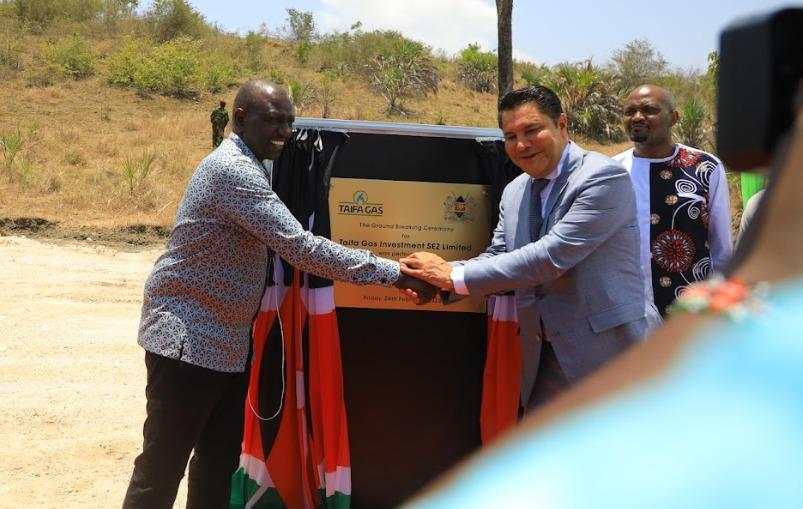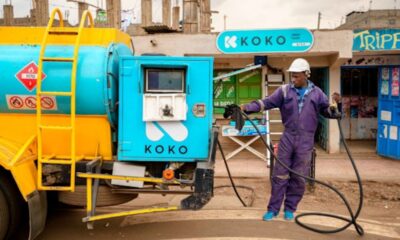Grapevine
LPG Tycoon Sponsors Petition to Halt Tanzanian Billionaire’s Sh16B Taifa Gas Plant

Mombasa, May 26, 2025 – A fresh legal battle has erupted in Likoni, Mombasa, as a petition seeks to block the construction of a Sh16 billion liquefied petroleum gas (LPG) terminal by Taifa Gas Investments SEZ Ltd, a company linked to Tanzanian billionaire Rostam Aziz.
The 30,000-tonne LPG facility at Dongo Kundu Special Economic Zone, launched with fanfare in February 2023, is poised to disrupt Kenya’s LPG market by offering competitive prices to benefit low-income households.
However, behind the petition lies a shadowy figure: a powerful Kenyan LPG tycoon accused of orchestrating resistance to protect his market monopoly.
The petition, filed at the Environment and Land Court in Mombasa, claims the Taifa Gas project threatens environmental degradation, citing the clearing of indigenous trees, disruption of coral ecosystems, and potential harm to local fishing grounds.
It further alleges that Taifa Gas lacks necessary permits from the National Environment Management Authority (Nema) and failed to engage in public participation.
However, sources close to the project suggest the petition is a calculated move by a well-known LPG magnate, notorious for sponsoring civil society groups to file fictitious legal challenges and incite community protests against competitors.
The tycoon, a dominant player in Kenya’s LPG industry, has long thrived on controlling supply chains and maintaining high prices, which have burdened ordinary Kenyans.
Industry insiders reveal that the tycoon’s influence has historically stifled competition, with a trail of derailed projects linked to his covert campaigns.
Taifa Gas, with its promise to lower LPG costs and level the market, threatens this monopoly, prompting what analysts describe as a desperate bid to maintain control.
For years, Rostam Aziz faced a barrage of petitions that delayed the Taifa Gas plant, keeping it on hold until President William Ruto’s administration granted the necessary licenses in 2023.
The groundbreaking ceremony, attended by Ruto himself, marked a turning point, signaling government support for the project as a game-changer for Kenya’s coastal economy.
Yet, the latest petition underscores the lengths to which the LPG tycoon will go to frustrate Aziz’s ambitions.
On May 15, the presiding judge declined to issue a temporary injunction to halt construction, directing the petitioners to serve Taifa Gas with the application and setting a hearing for July 29.
The court’s decision has bolstered hopes that the project will proceed, but the petitioners’ demands—an environmental restoration order and compensation for alleged ecological damage—continue to cast a shadow.
Critics of the petition argue it is a thinly veiled attempt to protect vested interests rather than genuine environmental concerns.
“The narrative around environmental harm is a smokescreen,” said a Mombasa-based energy analyst, speaking anonymously.
“This is about one man’s empire fighting to keep prices high and competition out. Taifa Gas could make cooking gas affordable for millions, and that’s a threat to the status quo.”
The petition also claims that Taifa Gas’s pipeline construction could harm water quality and fishing grounds, a critical livelihood for Likoni residents.
However, supporters of the project counter that Taifa Gas has committed to adhering to environmental regulations and engaging with local communities.
They point to the Dongo Kundu SEZ’s broader economic benefits, including job creation and infrastructure development, as evidence of its value to the region.
The LPG tycoon’s history of sponsoring protests and legal challenges is well-documented, with similar tactics used against other competitors in the past.
Community mobilizations, often fueled by misinformation, have been a hallmark of his strategy to delay or derail projects that challenge his dominance.
“This is not about the environment; it’s about power and profit,” said a local business leader in Mombasa.
“The tycoon’s grip on the LPG market has kept prices out of reach for the poor, and Taifa Gas is a direct challenge to that.”
As the legal battle unfolds, the Taifa Gas project remains a flashpoint in Kenya’s energy sector.
For Rostam Aziz, the fight is not just about building a gas plant but breaking down barriers to a fairer, more competitive market.
For the LPG tycoon, it’s a battle to preserve a lucrative monopoly.
The outcome of the July 29 hearing could determine whether Kenyan consumers finally gain access to affordable LPG—or if the tycoon’s influence will once again prevail.
Kenya Insights allows guest blogging, if you want to be published on Kenya’s most authoritative and accurate blog, have an expose, news TIPS, story angles, human interest stories, drop us an email on [email protected] or via Telegram
-

 Grapevine1 week ago
Grapevine1 week agoAlleged Male Lover Claims His Life Is in Danger, Leaks Screenshots and Private Videos Linking SportPesa CEO Ronald Karauri
-

 Lifestyle2 weeks ago
Lifestyle2 weeks agoThe General’s Fall: From Barracks To Bankruptcy As Illness Ravages Karangi’s Memory And Empire
-

 Grapevine5 days ago
Grapevine5 days agoRussian Man’s Secret Sex Recordings Ignite Fury as Questions Mount Over Consent and Easy Pick-Ups in Nairobi
-

 Investigations2 days ago
Investigations2 days agoMulti-Million Dollar Fraud: Three Kenyans Face US Extradition in Massive Cybercrime Conspiracy
-

 Investigations2 weeks ago
Investigations2 weeks agoEpstein’s Girlfriend Ghislaine Maxwell Frequently Visited Kenya As Files Reveal Local Secret Links With The Underage Sex Trafficking Ring
-

 News2 weeks ago
News2 weeks agoState Agency Exposes Five Top Names Linked To Poor Building Approvals In Nairobi, Recommends Dismissal After City Hall Probe
-

 Business1 week ago
Business1 week agoM-Gas Pursues Carbon Credit Billions as Koko Networks Wreckage Exposes Market’s Dark Underbelly
-

 Business2 weeks ago
Business2 weeks agoThe Crash of Koko Networks: A Detailed Look Into How and Why It Happened, And The Potential For A “Silver Lining” For Carbon Integrity
















